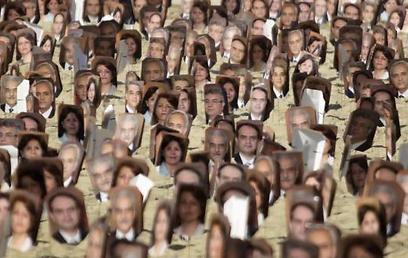A report published by the Special Rapporteur to the United Nations General Assembly finds that the Baha’i minority in Iran is continued to be systematically persecuted; facing international pressure, Iran has begun to discriminate against its members in more insidious ways, utulizing economic and higher education hindrances; the Baha’i faith is seen by the Iranian government as a political organization, and therefore as a threat to its regime.
A new report by the Special Rapporteur to the United Nations General Assembly described a systematic campaign against members of the Baha’i faith in Iran. The report cited accounts of “arbitrary arrests, detentions and prosecutions,” as well as restrictions on economic activities and education.
According to the investigation, at least 72 Baha’is are in jail, for “peaceful exercise of their faith,” a charge the government of Iran denies. In addition, many Baha’i students are prevented from completing their exams, and businesses who hire Baha’i workers are often targeted by the government.

“The situation for Baha’is is quite dire because they face discrimination in both law and practice in a variety of forms,” said Nassim Papayianni, an expert on Iran at Amnesty International. “They are denied access to higher education, and even if they enroll and finish a semester or a year, they won’t be allowed to finish their degree.”
The Baha’i International Community says that many students do not even take the entrance exams for university because they do not believe they will be accepted or allowed to finish their education. Others are forced to deny their religious affiliation to even be considered for admittance.
“Since 1979, the government of Iran has made it official policy to discriminate against and persecute its Baha’i citizens, an oppression that has evoked condemnation from the international community, activists, and, increasingly, ordinary citizens inside Iran,” the World News Service wrote. “In response, the government has shifted its tactics from outright arrests and imprisonments to less blatant forms of persecution, such as economic, educational, and cultural discrimination, in an attempt to conceal its ongoing efforts to destroy the Baha’i community as a whole.”
The group cited at least 20,000 times of anti-Baha’i propaganda that have been disseminated in the government-controlled media in Iran. The additionally found at least 950 incidents of economic suppression aimed at the Baha’is, including shop closings, dismissals, the actual or threatened revocation of business licenses and the demolition of businesses.
Out of the 79 million Iranian citizens, an estimated 300,000 are Baha’i, making it the largest non-Muslim minority in the country. Founded in 19th century Persia, the Baha’i faith is a monotheistic religion that emphasizes the spiritual unity of all humankind. Today, its adherents number approximately five million, and its international headquarters is located in Haifa, Israel.

Baha’i activists say the Iranian government is doing everything in its power to make it impossible for Baha’is to make a living, by not allowing them to work in the public sector and pressuring others in the private sector not to hire them.
“The most recent step was to start sealing Baha’i shops because they are closed on Baha’i holy days,” said Diane Ala’i, the representative to the United Nations for the Baha’i International Community. “The Baha’i want to stay in Iran. The love their country, and they want to make it a better place to live, but some are leaving.”
The clerics who rule Iran see the Baha’i as a political group, rather than a religious group, says Sanam Vikil, associate fellow at Chatham House.
“The political system in Iran is based on an interpretation of Shi’ite Islam, which is the ideology as well as the dominant religious tradition,” said Vikil.
Activists said the Iranian government is sensitive to international pressure, especially as the country seeks Western investment after the signing of the Iranian nuclear deal to limit its nuclear program in exchange for the lifting of sanctions. They added that now is the time for the West to step up pressure to end decades of discrimination against the Baha’i minority.
As reported by Ynetnews
